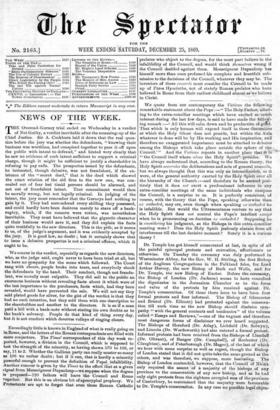NEWS OF THE WEEK.
THE Overend-Gurney trial ended on Wednesday in a verdict of Not Guilty, a verdict inevitable after the summing-up of the Chief Justice. Sir A. Cockburn laid it down that the real ques- tion before the jury was whether the defendants, "knowing their business was worthless, had conspired together to pass it off upon the public with intent to defraud," and hinted very clearly that he saw no evidence of such intent sufficient to support a criminal charge, though it might be sufficient to justify a shareholder in refusing to pay calls. The prospectus issued by the defendants, he intimated, though delusive, was not fraudulent, if the ex- istence of the " secret deed," that is the deed which showed the exact relation of the old firm to the new one, was con- cealed out of fear lest timid persons should be alarmed, and not out of fraudulent intent. That concealment would then be morally wrong, but not legally criminal. In judging of the intent, the jury must remember that the Gurneys had nothing to gain by it. They had surrendered every shilling they possessed, and could hardly have been desirous merely to stave off a bank- ruptcy, which, if the concern were rotten, was nevertheless inevitable. They must have believed that the gigantic character of their business would save it, and they did explain the facts quite truthfully to the new directors. This is the pith, as it seems to us, of the judge's argument, and it was evidently accepted by the jury. It is good law, no doubt ; but it certainly shows that to issue a delusive prospectus is not a criminal offence, which it ought to be.


































